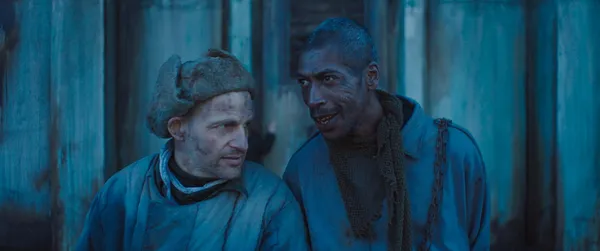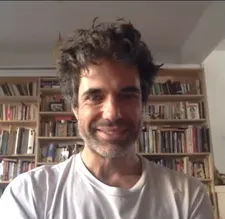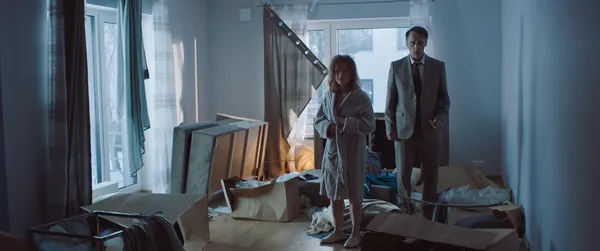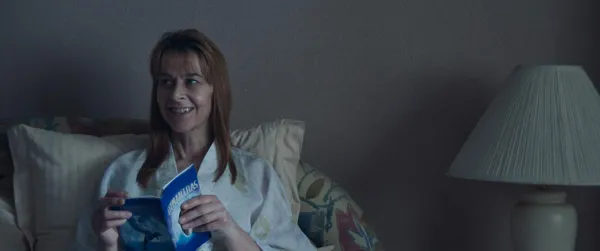 |
| K (Johann Myers) and Z (Géza Röhrig) in Undergods. Chino Moya: 'These characters have completely lost their identities, and all they have is a letter and a number' |
Spanish director Chino Moya’s feature debut Undergods is ambitious and multifaceted, unfolding as a sort of Russian doll of near-future dystopias, each holding their own dark commentary on modern life and framed by a story of two men, K (Johann Myers) and Z (Géza Röhrig), driving around a post-Apocalyptic wasteland on the lookout for dead bodies, while not being averse to fresh meat. It features a strong ensemble cast, including Kate Dickie, Ned Dennehy and Michael Gould. Where some directors might simply have offered a basic connection between the tales, these bleak worldviews feel interconnected in all sorts of unexpected ways.
Moya, who has lived in London for 15 years, says the film took three or four years to write. “I wanted to include all these different worlds and period dimensions, in a single movie, and I was trying to find a way in how to incorporate all of those in in this one single narrative and how to make sense out of it,” he adds. “The structure came almost naturally - less of a previously planned narrative architecture, but something that that, as I was writing, came along.
The director says that his cross-cultural experience of being born in Spain but now living elsewhere influenced the content of the film.
 |
| Chino Moya: 'I wanted to include all these different worlds and period dimensions, in a single movie' |
“I go back very often to Madrid, where I'm from, but it feels like I'm now a bit of a foreigner there, but also here. So you end up becoming a foreigner, pretty much everywhere. And maybe there’s an element of that.
“Also, I was born in Spain after Franco died – the dictator we had for 40 years - but before democracy started, so it was like a period of two, three years where there was this kind of political limbo in between a totalitarian state and when it became this crazy, like 1980s neoliberal market-driven democracy, which is what Spain turned into overnight. It went from this very backwards. country, very religious, a kind of totalitarian country overnight to being free, very liberal, very left wing, but also very neoliberal. A bit like what happened with Tony Blair here but it happened during the Eighties, this combination of socialism, but very market driven. All the promises of the new democracy and then, obviously, the broken dreams of 2008 all the failures of that democracy. I guess, having born in that sort of political limbo, I think there's something to do with this moving from one side, which is totalitarian world to another, which feels more like a consumerist society and how both somehow are equally falling apart, or both are crumbling and, and they are both utopias that don't seem to be fully delivering for the humans who live to live within them.”
There’s a strong sense of “the other” in Moya’s film, not just genuine strangers but those who may not be outsiders in the fullest sense after all, such as a segment involving a man (Sam Louwyck), who is less of an a interloper in the home of a family (Kate Dickie, Jonathan Case, Adrian Rawlins) than he might first appear. As Moya puts it, “both men become strangers in their own domestic environment”.
He adds: “I guess that maybe has an element also to do with being a foreigner and now I'm going to be foreign for the rest of my life. Because even now, I have a daughter here, I doubt I'll go back to Spain and even if I go back, I'll probably feel it feel a bit of a foreigner there. So I came to terms with the idea that I'm going to have to be a foreigner, I guess, in general.
 |
| Chino Moya: 'An important element of the movie are these white middle-class men and the constant fear of ‘the other’' |
“Also, an important element of the movie are these white middle-class men and the constant fear of ‘the other’ and the constant fear an intruder is going to come into your country, going to steal your jobs, going to steal your wife or your daughter, so your family, and that caused that fear that we are experiencing right now. It's affecting all of us politically. Especially white middle-aged men being so scared of these ‘others’ coming into their own territory, which they have been in control for so many years, centuries and millennia.” Moya’s film taps into the way that just an attitude in itself can create a toxic environment for others. The men in his film almost don’t need anyone else to walk into their environment in order to have an enemy because they’ve already self-generated their own toxic space.
“That's the idea,” says Moya. “I only need to walk out of my house in London and look at all these tower blocks. I never understood why we, as civilised humans, decided to build those blocks instead of something nice. I grew up in a tower block myself in Madrid, and the view from my tower block was this other tower block in front of me.”
“Especially in urban environment, which is where the movie takes place, it's very hostile to human living and human beings and still that's what we've decided to create. I’m intrigued by humans, with all the technology and the all the knowledge that we have about sociology, technology, science, why we ended up living in environments like this, why we haven't created this actually real utopian environments, where we are close to nature and everything's great and all the spaces are very liveable. The more modern buildings are then the less the quality of the materials.
“I was reading about one of the most luxurious condos in Manhattan and the complaints of the owners were crazy. They just built it a couple of years ago but the materials are awful, it’s kind of falling apart.” There’s a sense of modern malaise that runs through Moya’s film, not just in the buildings his characters inhabit but in the way that the characters interact with their environment – so that at one point we see Kate Dickie pitching fresh food into a bin, before sitting down to a bland ready meal with her family.
“That's also something that surprises me,” says Moya. “especially living in in the UK, but even when I go back to Spain now, it’s equally bad. It's always surprises me is how one of the joys of modern life is eating nice food but also we got rid of that and now, a lot of people, all they eat is ready meals - especially at lunchtime when you're working in office.”
Due to the structure of the film, there’s a big ensemble cast, which is peppered with fine character actors including Dickie and Ned Dennehy – who plays another of the film’s unwelcome guests.
Moya says he knew he wanted Dennehy and Dickie who “immediately fitted into the world of Undergods”.
He adds: “One of the things I'm most pleased with is the casting. None of these guys had inflated egos.”
In the framing story, the characters have even been reduced to single letters for names – K and Z (played by Johann Myers and Géza Röhrig).
“I felt I like the idea of this world has been so deprived of humanity, it's a world where everything has been lost,” says Moya. “All traditions have disappeared, all we have is the shells of buildings of this former civilization that somehow came to an end. The humans just live in pure survival mode - it is all about finding food, there’s not even money any more. These characters have completely lost their identities, and all they have is a letter and a number. No one has an identity because even that world doesn't have an identity any more.”
 |
| Kate Dickie, who Moya says 'immediately fitted into the world of Undergods' |
The letters K and Z, might bring up memories of Franz Kafka’s Josef K in The Trial but they also put me in mind of the Nazi concentration camp KZ, in Mauthausen, Austria, and though it turns out that link is coincidental, Moya says concentration camps were “a massive influence on the movie”.
“I read a lot of a lot of first-hand accounts of people who are camp survivors. I read a lot of books by camp survivors and that definitely informed a lot of Undergods. And Josef K? Kafka is a massive influence on Undergods too. If not consciously, then maybe subconsciously.”
He adds: “After the Spanish Civil War, my grandfather was put into some form of camp – it didn’t have guards and fences but it was kind of a valley where they put a lot of prisoners or people that opposed the new regime during the war. And he was confined in that space for years so my dad didn't grow up with his dad because his dad was put into this into this place. So my grandmother, apparently, she needed to go by horse – because they didn’t have a car at the time – on two or three days’ journey to visit her husband once or twice a year. So my dad grew up without his father and I think there was there was an element of that but also certain experience of being deprived of your freedom that somehow in a way we are all experiencing, weirdly enough.
“Concentration camps are most extreme expression of human evil and cruelty, one of the worst things that humans can do to themselves, which is something very important in Undergods. I want to explore that that side of humanity.”
I ask if High-Rise author JG Ballard was also an influence.
“Yeah, big time. JG Ballard is definitely someone who I like a lot. I like High-Rise a lot and Crash is amazing. He also had some sort of concentration camp experience himself [in Japan, which he writes about in Empire Of The Sun]. I never thought about it, but he had the experience of the modern middle-class city, but also the experience of the concentration camp.”
As with many films this year, Covid has made its effects felt on Undergods, which was mastered the week before the first lockdown. When I spoke to Moya, the film had just played at Glasgow Film Festival and he was hoping it would get some sort of theatrical release – which it will on March 17. The director says he has continued to write during lockdown, “It’s amazing how focused you become,” he says.
He says he now has “three scripts at different stages”, including “a British science-fiction thing and a horror”. He adds: “I think the next one will be in English. At one point, I would love to make a Spanish film but I'm not yet ready.”





















